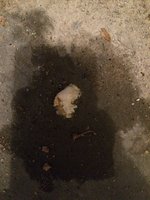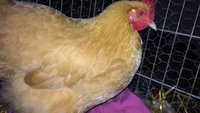Chickencrazy22
In the Brooder
- Jun 23, 2016
- 29
- 7
- 42
I have a hen that I noticed about a week ago wasn’t eating very well. Monday I took her inside to separate her and watch her better. She drinks water but is not eating much. She sits with her feathers fluffed out as well. Her comb isn’t pale nor her feet. I have tried feeding her apples, her feed, calcium, etc. she is not laying eggs but isn’t egg bound as I feel she has survived to long to be egg bound. Please any suggestions on what to do? Vet is out of the question as we have no bird vets around already called. Thank you








 Are you sure her abdomen is not swollen? Cupping your hand between her legs and then comparing what you feel to a similar healthy hen is the best way to assess it. Since her comb is red, my concern would be that she in laying internally. Over time they build up a mass of egg yolks in their abdominal cavity, but it can take weeks or months to become obvious and the bird will usually act relatively normal during that time apart from not producing eggs.
Are you sure her abdomen is not swollen? Cupping your hand between her legs and then comparing what you feel to a similar healthy hen is the best way to assess it. Since her comb is red, my concern would be that she in laying internally. Over time they build up a mass of egg yolks in their abdominal cavity, but it can take weeks or months to become obvious and the bird will usually act relatively normal during that time apart from not producing eggs. It is so difficult trying to diagnose a bird through someone else's eyes and touch and perspective! When are they going to make computers that you can reach through the screen and feel for yourself!
It is so difficult trying to diagnose a bird through someone else's eyes and touch and perspective! When are they going to make computers that you can reach through the screen and feel for yourself!